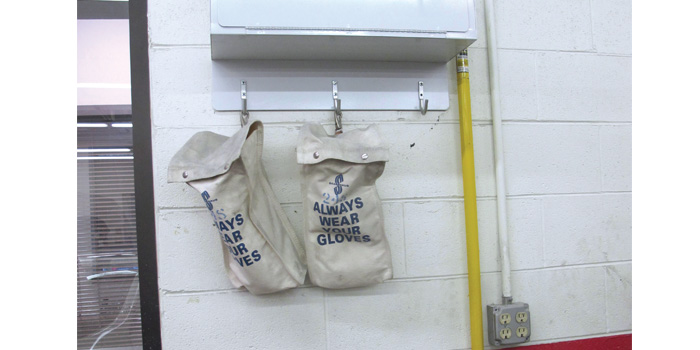Shop safety is so incredibly important for a myriad of reasons I think all of us can list with relative ease. Unfortunately, it’s a topic that isn’t anywhere near touched upon or thought of with the gravity it should be.
A recent incident that unfortunately cost a technician his life at a former job brought this issue to the forefront for me. I write this article in Noah’s memory and hope that it might save someone from being injured or worse.
Dangerous Business
Just like much of the subject matter from my previous articles in BodyShop Business, safety is a very simple topic that I believe most people think they have a handle on. Maybe they think this because they’ve never had a major issue, or they watched a safety video when they were hired. But it’s easy to get careless or complacent. Just like some of the other things I’ve written about, it’s always good to have a “fresh set of eyes.” We work in a fast-paced and dangerous business. It’s easy to become complacent and start to suffer from tunnel vision. Let me say it again: We work in a very dangerous business, and this needs to be remembered.
Pressure
As an industry, we’re under extreme and, at times, unfair external pressures to be faster and cheaper than ever before. There seems to be no end in sight. The labor rate is lower than it should be and isn’t moving anywhere near the degree it deserves to. Vehicles move faster through the process than ever before, and if they don’t move fast enough, you end up taking what little profit there is and paying for rental costs. It’s a vicious cycle and it’s getting worse, not better.
With all that pressure, and every day being an emergency, shop safety is no place to cut corners. Unfortunately, with each day passing like a blur, it seems that anything other than costs and production are taking a backseat. This is a very dangerous way to operate, and the purpose of this article is to try to stop that from happening.
Culture
Shop safety needs to be a company culture and a “non-negotiable” of your business. It needs to be ingrained in the DNA of the company and start with ownership. From ownership, it needs to be embraced by management and each employee. No one is above or below taking shop safety seriously. In order for your shop to fully embrace shop safety as a culture, everyone must be involved and take it seriously.
Hazards
On any given day, and in any given shop, it’s easy to pick out a large handful of potential dangers in just a few minutes. Some examples include:
- Working under lifts, jacks and jack stands
- Tripping over cords, hoses or parts
- Parts falling from carts or shelves
- Foreign objects getting in eyes
- Exposures to chemicals through skin or lungs
- Chains breaking loose and flying from pulling
- Blocked emergency exits and electrical panels
- Danger from welding
- Fire Equipment not maintained or functioning properly
- Contact with hazardous wastes
- Danger from sharp metal
There are many other potential hazards and dangers in a shop than those listed above, but my intent was not to list every single one. I merely wanted to list easily identifiable ones that you can see in a two-minute walk through your shop.
I’m also not a trained safety professional, nor do I pretend to be one. There are trained professionals who eat, sleep and live safety who do a fabulous job. If I could identify the hazards and potential hazards above that easily, I’m sure you could do at least that or better. I encourage you to take the time to walk through your shop and ask your team to join you. Doing it could potentially save lives.
Hire a Professional
Doing a walkaround would be a great start, but investing in safety by hiring a professional contractor to come in and audit your facility and safety procedures would be even better. If you think it’s not in the budget to pay for such a service, allow me to ask you one question: What do accidents, injuries or even a death cost? The price of high workers compensation insurance, OSHA fines, medical bills or lawsuits all would make the cost of hiring a safety consultant pale in comparison. Hiring a professional would potentially open your eyes to hazards and issues you may have no idea about.
The point is, there are companies out there, and there are options for you to investigate. This may save you money on your insurance that could potentially help to pay for this expense. One such company I have personal experience with is GMG Envirosafe (www.gmgenvirosafe.com). The Internet is a great place to find information on shop safety. Instead of worrying about fantasy sports this season, why not invest your time in making your shop a safer place? A simple Google search on auto body shop safety yields over 24 million results, ranging from the OSHA website to YouTube videos. The information is out there; ignorance is no excuse. You have to want to make safety a priority and seek out the information. You can also reach out to your garagekeepers and workers compensation representatives for help in identifying potential hazards.
Summary
An organization that takes shop safety and its employees’ well-being seriously is going to have happier employees than a shop that does not. The culture of that organization is going to be a happy one, and employee retention is going to be higher.
There’s no reason and no excuse for not making shop safety a top priority. Talk about it with your team, and involve everyone. Walk around the facility and try to identify hazards that may be lurking. Have safety meetings. Take action – that’s what it’s all about. Start somewhere. It’s better than doing nothing, and you may just safe a life.














